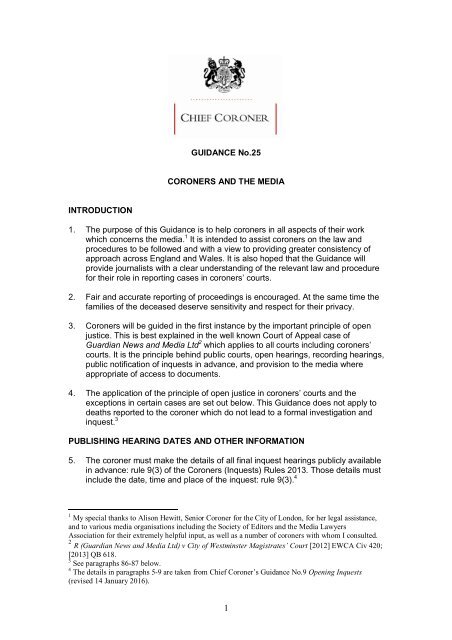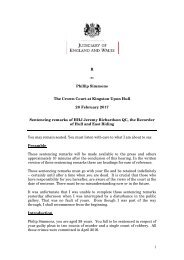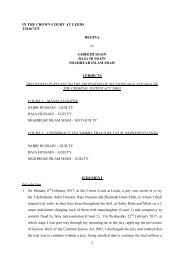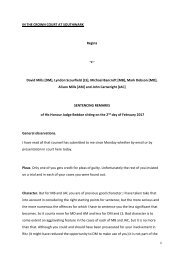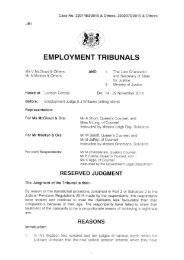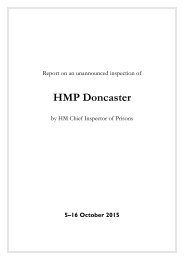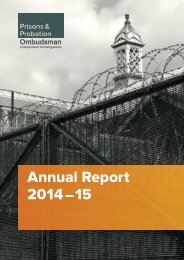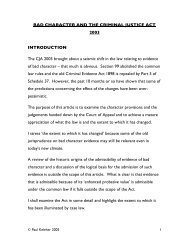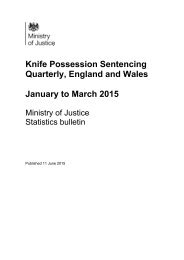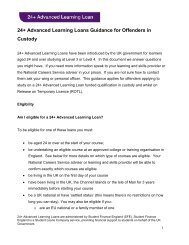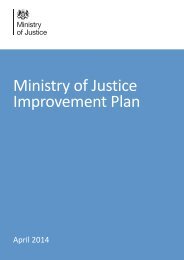guidance-no-25-coroners-and-the-media
guidance-no-25-coroners-and-the-media
guidance-no-25-coroners-and-the-media
Create successful ePaper yourself
Turn your PDF publications into a flip-book with our unique Google optimized e-Paper software.
GUIDANCE No.<strong>25</strong><br />
CORONERS AND THE MEDIA<br />
INTRODUCTION<br />
1. The purpose of this Guidance is to help <strong>coroners</strong> in all aspects of <strong>the</strong>ir work<br />
which concerns <strong>the</strong> <strong>media</strong>. 1 It is intended to assist <strong>coroners</strong> on <strong>the</strong> law <strong>and</strong><br />
procedures to be followed <strong>and</strong> with a view to providing greater consistency of<br />
approach across Engl<strong>and</strong> <strong>and</strong> Wales. It is also hoped that <strong>the</strong> Guidance will<br />
provide journalists with a clear underst<strong>and</strong>ing of <strong>the</strong> relevant law <strong>and</strong> procedure<br />
for <strong>the</strong>ir role in reporting cases in <strong>coroners</strong>’ courts.<br />
2. Fair <strong>and</strong> accurate reporting of proceedings is encouraged. At <strong>the</strong> same time <strong>the</strong><br />
families of <strong>the</strong> deceased deserve sensitivity <strong>and</strong> respect for <strong>the</strong>ir privacy.<br />
3. Coroners will be guided in <strong>the</strong> first instance by <strong>the</strong> important principle of open<br />
justice. This is best explained in <strong>the</strong> well k<strong>no</strong>wn Court of Appeal case of<br />
Guardian News <strong>and</strong> Media Ltd 2 which applies to all courts including <strong>coroners</strong>’<br />
courts. It is <strong>the</strong> principle behind public courts, open hearings, recording hearings,<br />
public <strong>no</strong>tification of inquests in advance, <strong>and</strong> provision to <strong>the</strong> <strong>media</strong> where<br />
appropriate of access to documents.<br />
4. The application of <strong>the</strong> principle of open justice in <strong>coroners</strong>’ courts <strong>and</strong> <strong>the</strong><br />
exceptions in certain cases are set out below. This Guidance does <strong>no</strong>t apply to<br />
deaths reported to <strong>the</strong> coroner which do <strong>no</strong>t lead to a formal investigation <strong>and</strong><br />
inquest. 3<br />
PUBLISHING HEARING DATES AND OTHER INFORMATION<br />
5. The coroner must make <strong>the</strong> details of all final inquest hearings publicly available<br />
in advance: rule 9(3) of <strong>the</strong> Coroners (Inquests) Rules 2013. Those details must<br />
include <strong>the</strong> date, time <strong>and</strong> place of <strong>the</strong> inquest: rule 9(3). 4<br />
1 My special thanks to Alison Hewitt, Senior Coroner for <strong>the</strong> City of London, for her legal assistance,<br />
<strong>and</strong> to various <strong>media</strong> organisations including <strong>the</strong> Society of Editors <strong>and</strong> <strong>the</strong> Media Lawyers<br />
Association for <strong>the</strong>ir extremely helpful input, as well as a number of <strong>coroners</strong> with whom I consulted.<br />
2 R (Guardian News <strong>and</strong> Media Ltd) v City of Westminster Magistrates’ Court [2012] EWCA Civ 420;<br />
[2013] QB 618.<br />
3 See paragraphs 86-87 below.<br />
4 The details in paragraphs 5-9 are taken from Chief Coroner’s Guidance No.9 Opening Inquests<br />
(revised 14 January 2016).<br />
1
6. The coroner must publish, preferably on a website (part of <strong>the</strong> local authority<br />
website or, better still, a separate website), <strong>and</strong> where possible at least seven<br />
days in advance of <strong>the</strong> hearing:<br />
<br />
<br />
<br />
<br />
<br />
<strong>the</strong> date, time <strong>and</strong> place of <strong>the</strong> inquest<br />
<strong>the</strong> name of <strong>the</strong> coroner (where k<strong>no</strong>wn)<br />
whe<strong>the</strong>r a jury inquest<br />
<strong>the</strong> name <strong>and</strong> age of <strong>the</strong> deceased<br />
<strong>the</strong> date <strong>and</strong> place of death (hospital or town).<br />
It is <strong>no</strong>t appropriate for <strong>the</strong> <strong>no</strong>tice to include <strong>the</strong> medical cause of death, brief<br />
circumstances of <strong>the</strong> death or <strong>the</strong> likely conclusion of <strong>the</strong> inquest.<br />
7. Where possible <strong>the</strong> same practice should apply to each opening hearing (but <strong>no</strong>t<br />
if it will cause delay) <strong>and</strong> Pre-Inquest Review hearings (PIRs) 5 . If <strong>the</strong> hearing is<br />
in public <strong>and</strong> <strong>the</strong> public (including <strong>the</strong> press) have a right to attend, that right is of<br />
little value unless <strong>no</strong>tice of <strong>the</strong> hearing is made publicly available in advance.<br />
8. Where <strong>coroners</strong> have <strong>no</strong> access to a website in order to publicise cases, <strong>the</strong>y<br />
should at <strong>the</strong> very least post a <strong>no</strong>tice of forthcoming cases outside <strong>the</strong> court on a<br />
regular basis. Where possible, this should include openings <strong>and</strong> PIR hearings.<br />
Some <strong>coroners</strong> also make it k<strong>no</strong>wn publicly that <strong>the</strong>y will open inquests at a<br />
certain venue on fixed days during <strong>the</strong> week at fixed times.<br />
9. Some <strong>coroners</strong> also use <strong>the</strong> good practice of using an email list of local<br />
hospitals, police, press, funeral directors etc who are regularly updated with<br />
forthcoming cases.<br />
OPEN HEARINGS<br />
10. The general public is entitled to attend all inquest hearings (with limited<br />
exceptions, below).<br />
11. Hearings in <strong>the</strong> coroner’s court must be held in a courtroom which is accessible<br />
to <strong>the</strong> public without physical barrier, so that any member of <strong>the</strong> public can ‘drop<br />
in’ to see how a hearing is conducted by a coroner: see generally Storer v British<br />
Gas Plc [2000] 1 WLR 1237, 1244. 6<br />
12. Members of <strong>the</strong> press are members of <strong>the</strong> public for <strong>the</strong>se purposes.<br />
13. The general rule is that all hearings, including openings, PIR hearings <strong>and</strong> final<br />
inquest hearings, must be held in public <strong>and</strong> <strong>the</strong>refore are open to journalists:<br />
rule 11.<br />
14. The exceptions to this rule are very limited. They are set out in rule 11(2)-(5):<br />
<br />
<br />
The public may be excluded from a PIR hearing ei<strong>the</strong>r in <strong>the</strong> interests of<br />
national security or if <strong>the</strong> coroner considers it would be in <strong>the</strong> interests of<br />
justice. The latter provision should <strong>no</strong>t be used over restrictively.<br />
The public may be excluded from an inquest hearing but only in <strong>the</strong><br />
interests of national security.<br />
5 See Chief Coroner’s Guidance No22 Pre-Inquest Review Hearings (18 January 2016).<br />
6 Referring to Hodgson v Imperial Tobacco Ltd. [1998] 1 WLR 1056, 1069.<br />
2
15. If <strong>the</strong> coroner directs that <strong>the</strong> public should be excluded from a hearing or part of<br />
a hearing, brief reasons must be given publicly.<br />
16. Names of <strong>the</strong> deceased, witnesses (unless granted a<strong>no</strong>nymity) <strong>and</strong> Interested<br />
Persons 7 will always be given in open court <strong>and</strong> <strong>the</strong>refore to <strong>the</strong> <strong>media</strong>. For<br />
clarity first <strong>and</strong> last names should be given.<br />
17. Applications for a<strong>no</strong>nymity of witnesses or screening of witnesses 8 will be heard<br />
in public.<br />
18. Where possible (a) any consideration of excluding <strong>the</strong> public from a hearing, or<br />
(b) any application for a<strong>no</strong>nymity or screening of witnesses, or (c) <strong>the</strong> possible<br />
imposition of reporting restrictions (see below) should be addressed in advance<br />
at a PIR hearing, with due <strong>no</strong>tice to <strong>the</strong> <strong>media</strong>. This gives <strong>the</strong> opportunity for <strong>the</strong><br />
press to make representations should <strong>the</strong>y wish. It also avoids late applications<br />
by <strong>the</strong> <strong>media</strong> at <strong>the</strong> inquest which <strong>the</strong> coroner may find disruptive.<br />
19. National <strong>media</strong> organisations may be <strong>no</strong>tified by contacting <strong>the</strong> Press<br />
Association (which has agreed to be a point of contact, as with Family Division<br />
orders, for this purpose): for details see<br />
www.<strong>media</strong>lawyer.press.net/courtapplications/. The agreed person to contact at<br />
<strong>the</strong> press Association is Mike Dodd. His e-mail address<br />
is Mike.dodd@pressassociation.com <strong>and</strong> his contact numbers are 0207 963<br />
7132 or 07973 846 851. Local press <strong>and</strong> <strong>media</strong> organisations should also be<br />
informed in advance where possible.<br />
20. Seating should be made available for journalists in court. In sensitive cases <strong>the</strong><br />
seating for <strong>the</strong> press should be separate from members of <strong>the</strong> deceased’s<br />
family.<br />
FORMAL RECORDINGS OF HEARINGS<br />
21. All inquest hearings, including PIR hearings, must be recorded by <strong>the</strong> court <strong>and</strong><br />
<strong>the</strong> coroner must keep <strong>the</strong> recording: rule 26. 9<br />
22. A recording is a ‘document’ for <strong>the</strong> purposes of <strong>the</strong> Coroners (Investigations)<br />
Regulations 2013 <strong>and</strong> <strong>the</strong> Coroners (Inquests) Rules 2013. 10<br />
23. In considering a request for a copy of a recording (or any o<strong>the</strong>r document),<br />
<strong>coroners</strong> will bear in mind <strong>the</strong> clear distinction in law between disclosure to<br />
Interested Persons <strong>and</strong> disclosure to o<strong>the</strong>rs including <strong>the</strong> <strong>media</strong>.<br />
Disclosure to Interested Persons<br />
24. Where an Interested Person asks for disclosure of a document, including a<br />
recording of a hearing held in public or a post-mortem report or any o<strong>the</strong>r report<br />
provided to <strong>the</strong> coroner in <strong>the</strong> course of <strong>the</strong> investigation or any document which<br />
<strong>the</strong> coroner considers relevant to <strong>the</strong> inquest, <strong>the</strong> coroner must provide a copy of<br />
that document or make it available for inspection: see rules 12-16.<br />
7 For <strong>the</strong> meaning of Interested Persons see section 47, Coroners <strong>and</strong> Justice Act 2009.<br />
8 Rule 18.<br />
9 See Chief Coroner’s Guidance No.4 Recordings (16 July 2013).<br />
10 Regulation 2, rule 2.<br />
3
<strong>25</strong>. The coroner may only refuse a request by an Interested Person on specified<br />
grounds: rule 15.<br />
26. A journalist or representative of <strong>the</strong> <strong>media</strong> is <strong>no</strong>t an Interested Person.<br />
Disclosure to o<strong>the</strong>rs<br />
27. The coroner may provide any document or a copy of any document, including a<br />
recording, ‘to any person who in <strong>the</strong> opinion of <strong>the</strong> coroner is a proper person to<br />
have possession of it’: regulation 27(2)).<br />
28. In relation to a request by anyone o<strong>the</strong>r than an Interested Person for a<br />
recording or any o<strong>the</strong>r document, <strong>the</strong> discretion of <strong>the</strong> coroner on this issue<br />
(derived from <strong>the</strong> word ‘may’) must be exercised judicially. 11 The coroner should<br />
take into account:<br />
<br />
<br />
<br />
<br />
<br />
<br />
<strong>the</strong> person requesting <strong>the</strong> document<br />
<strong>the</strong> reason for <strong>the</strong> request<br />
<strong>the</strong> public interest<br />
<strong>the</strong> sensitivities of particular passages of evidence<br />
<strong>the</strong> need for editing or redaction (if any, bearing in mind this was a public<br />
hearing), <strong>and</strong><br />
o<strong>the</strong>r relevant factors<br />
29. Although <strong>coroners</strong> have a discretion on this point, members of <strong>the</strong> <strong>media</strong> (who<br />
can show identification where necessary) should <strong>no</strong>rmally be expected to be<br />
considered proper persons for <strong>the</strong>se purposes.<br />
30. A copy of a recording should also be accompanied by a <strong>no</strong>tice warning against<br />
improper use. 12 A charge of £5.00 may be made for a copy of a recording or<br />
o<strong>the</strong>r document.<br />
31. Coroners are <strong>no</strong>t obliged to produce transcripts of hearings.<br />
EFFECT OF OPENING HEARING<br />
32. Proceedings become ‘active’ for contempt of court purposes at <strong>the</strong> hearing when<br />
an inquest is opened: see paragraph 12 of Schedule 1, Contempt of Court Act<br />
1981. 13<br />
TWEETING, TEXTING, MESSAGING etc; NO PHOTOGRAPHS<br />
33. Live text-based communications by journalists or legal commentators for <strong>the</strong><br />
sole purpose of fair <strong>and</strong> accurate reporting are permitted at all hearings, in<br />
accordance with <strong>the</strong> Lord Chief Justice’s guidelines for court proceedings:<br />
Practice Guidance, 2011. Phones <strong>and</strong> laptops must be used silently.<br />
34. O<strong>the</strong>r members of <strong>the</strong> public who wish to make records in this way must apply to<br />
<strong>the</strong> coroner for permission (Practice Guidance, above). No application need be<br />
11 See Chief Coroner’s Law Sheet No.5 The Discretion of <strong>the</strong> Coroner (revised 18 January 2016).<br />
12 See Guidance No.4 Recordings (16 July 2013) at paragraph 9.<br />
13 See Chief Coroner’s Guidance No.9 Opening Inquests (revised 14 January 2016).<br />
4
made by journalists or legal commentators. Except for <strong>the</strong>se purposes, mobile<br />
phones must be switched off.<br />
35. No sound recording may be taken except with <strong>the</strong> permission of <strong>the</strong> coroner:<br />
section 9(1), Contempt of Court Act 1981. Where appropriate <strong>the</strong> coroner may<br />
permit a journalist to record proceedings, but only as an aide memoire to fair <strong>and</strong><br />
accurate reporting; <strong>the</strong> recording must <strong>no</strong>t be broadcast or used for any o<strong>the</strong>r<br />
purpose. 14<br />
36. It is a criminal offence for anyone to take photographs or o<strong>the</strong>r images, still or<br />
moving, in court or within <strong>the</strong> precincts of <strong>the</strong> court: section 41(1), Criminal<br />
Justice Act 19<strong>25</strong>. Court artists, however, may attend inside court (as a member<br />
of <strong>the</strong> public) so long as sketches are only made outside <strong>the</strong> courtroom. Jurors<br />
especially must be protected from publicity.<br />
MEDIA REQUESTS FOR ACCESS TO DOCUMENTS<br />
37. The <strong>media</strong> may ask for access to a document referred to in any inquest<br />
proceedings.<br />
38. A coroner need <strong>no</strong>t treat a request as coming from <strong>the</strong> <strong>media</strong> unless <strong>the</strong><br />
applicant is a bona fide journalist <strong>and</strong> <strong>the</strong> request is for a proper journalistic<br />
purpose. The request must specify precisely <strong>the</strong> document sought <strong>and</strong> explain<br />
why it is required. Where any of this is unclear, <strong>the</strong> coroner may ask for<br />
clarification.<br />
39. The important distinction between disclosure to Interested Persons <strong>and</strong><br />
disclosure to o<strong>the</strong>rs has been set out above (see paragraphs 24-29). Media<br />
requests for access to documents will be dealt with under <strong>the</strong> discretionary<br />
power to disclose in regulation 27(2).<br />
40. In deciding whe<strong>the</strong>r to grant access, <strong>the</strong> coroner should consider <strong>the</strong> principles<br />
discussed below.<br />
The coroner’s approach<br />
41. Access to documents referred to in court is governed in <strong>the</strong> first instance by <strong>the</strong><br />
open justice principle. Open justice is a constitutional principle ‘at <strong>the</strong> heart of<br />
our system of justice <strong>and</strong> vital to <strong>the</strong> rule of law’: per Toulson LJ in Guardian<br />
News <strong>and</strong> Media Ltd. 15<br />
42. Where <strong>the</strong> press requests access to material referred to in an inquest, in<br />
recognition of <strong>the</strong> role of <strong>the</strong> press as ‘public watchdog’ in a democratic society,<br />
<strong>the</strong>re is a presumption in favour of providing access: Observer <strong>and</strong> Guardian v<br />
UK [1992] 14 EHRR 153. The purpose of disclosure is to enable <strong>the</strong> public to<br />
underst<strong>and</strong> <strong>and</strong> scrutinise <strong>the</strong> justice system.<br />
43. The <strong>media</strong> is <strong>no</strong>t entitled to see documents <strong>no</strong>t referred to in court. If a coroner<br />
holds documents which have <strong>no</strong>t been relied upon <strong>and</strong> adduced in evidence,<br />
<strong>the</strong>se need <strong>no</strong>t be disclosed.<br />
14 For draft directions see Section 1 of The Coroner Bench Book.<br />
15 See Fn 2.<br />
5
44. The <strong>media</strong> is also <strong>no</strong>t entitled to have access to documents before a hearing,<br />
save when disclosure is necessary to enable <strong>the</strong> <strong>media</strong> itself to make<br />
representations (when entitled to be heard), for example in relation to a<br />
proposed restriction on reporting.<br />
45. The presumption in favour of granting access does <strong>no</strong>t mean that <strong>the</strong> <strong>media</strong> are<br />
‘entitled to disclosure’, <strong>no</strong>r that it should take place ‘by default’. Not all<br />
documents need be provided. The coroner may refuse access where <strong>the</strong>re are<br />
compelling reasons against it. The presumption of providing access under<br />
regulation 27(2) 16 is <strong>the</strong>refore capable of rebuttal, but only for good <strong>and</strong><br />
justifiable reason. In <strong>the</strong> Guardian News case it was described as ‘some strong<br />
contrary argument’ or ‘countervailing reasons’.<br />
46. The coroner should <strong>the</strong>refore <strong>no</strong>rmally accede to a <strong>media</strong> request unless <strong>the</strong>re<br />
is a compelling reason <strong>no</strong>t to. The coroner must make <strong>the</strong>se decisions on a case<br />
by case basis, document by document, <strong>no</strong>ting <strong>the</strong> presumption of disclosure but<br />
also bearing in mind that <strong>the</strong> <strong>media</strong> are entitled to attend all inquest hearings<br />
which are held in public.<br />
47. Disclosure, where provided, may be of <strong>the</strong> whole or part of <strong>the</strong> document. Where<br />
appropriate a document may be redacted.<br />
Refusal of access<br />
48. Reasons for refusal of access may include, amongst o<strong>the</strong>rs:<br />
<br />
<br />
<br />
<br />
<br />
<br />
<br />
national security<br />
public interest immunity<br />
legal privilege<br />
<strong>the</strong> avoidance of prejudice to current or future criminal proceedings arising<br />
out of <strong>the</strong> death 17<br />
<strong>the</strong> protection of personal information (particularly in <strong>the</strong> case of <strong>the</strong><br />
vulnerable) which is sensitive or if disclosed could give rise to a risk of<br />
harm<br />
<strong>the</strong> Article 8 rights of witnesses or o<strong>the</strong>rs identifiable who may need to be<br />
protected from <strong>the</strong> glare of publicity. There may, for example, be a good<br />
reason for refusing access to <strong>the</strong> contents of a suicide <strong>no</strong>te, even though it<br />
has been referred to in court. There may be good reason to limit or refuse<br />
<strong>the</strong> wider broadcast of certain images or video / audio footage, even if <strong>the</strong>y<br />
were seen or heard in open court<br />
if <strong>the</strong> application would be refused under rule 15 if made by an Interested<br />
Person.<br />
49. The rationale for protecting personal information which is sensitive or could give<br />
rise to a risk of harm or be damaging or would breach any right of confidence,<br />
especially for <strong>the</strong> vulnerable such as children, <strong>the</strong> mentally disabled or <strong>the</strong><br />
elderly or infirm, is that <strong>the</strong>re is <strong>no</strong> obvious public interest in publicity.<br />
50. It may also be a good reason for refusal if <strong>the</strong> request would:<br />
16 See paragraph 27 above.<br />
17 See, for example, R (Green) v Police Complaints Authority [2004] UKHL 6; [2004] 1 WLR 7<strong>25</strong> at<br />
[71]. Coroners should <strong>no</strong>te that a document which ‘relates to contemplated or commenced criminal<br />
proceedings’ is a ground for refusal of disclosure even to Interested Persons: rule 15(d).<br />
6
e disruptive to <strong>the</strong> court proceedings, or<br />
place a great burden on <strong>the</strong> court: see Guardian News case. 18<br />
Coroners’ courts do <strong>no</strong>t always have ready access to photocopying, scanning<br />
<strong>and</strong> o<strong>the</strong>r facilities. Staff for carrying out <strong>the</strong>se tasks are <strong>no</strong>t always available.<br />
The balancing exercise<br />
51. In making a decision whe<strong>the</strong>r to provide or refuse access, <strong>and</strong> in deciding<br />
whe<strong>the</strong>r disclosure is necessary or desirable for open justice purposes, <strong>the</strong><br />
coroner is required to carry out a fact-specific proportionality exercise. 19 It may<br />
sometimes be necessary, for example, for <strong>the</strong> coroner to weigh in <strong>the</strong> balance<br />
on <strong>the</strong> facts of <strong>the</strong> specific case <strong>the</strong> competing rights of (1) <strong>the</strong> <strong>media</strong> under<br />
Article 10 of <strong>the</strong> European Convention on Human Rights (freedom of<br />
expression) with <strong>the</strong> rights of (2) a particular person (including Interested<br />
Persons, witnesses <strong>and</strong> any individual who could be affected by <strong>the</strong> disclosure)<br />
under Article 8 (right to respect for private <strong>and</strong> family life) 20 where disclosure<br />
could give rise to a risk of harm or o<strong>the</strong>rwise interfere with those rights.<br />
52. Where possible <strong>the</strong> coroner should take into account (as a relevant factor) <strong>the</strong><br />
views on disclosure of Interested Persons <strong>and</strong> o<strong>the</strong>rs including those who<br />
supplied <strong>the</strong> document to <strong>the</strong> coroner <strong>and</strong> should ask if <strong>the</strong>re is any objection to<br />
disclosure.<br />
Reasons<br />
53. In granting or refusing an application for disclosure (particularly <strong>the</strong> latter), <strong>the</strong><br />
coroner should give brief reasons. When refusing access <strong>the</strong> ruling should refer<br />
to:<br />
(1) The application<br />
(2) The nature of <strong>the</strong> material requested<br />
(3) Whe<strong>the</strong>r <strong>the</strong> application has ‘journalistic purpose’<br />
(4) The principle of open justice; Article 10 freedom of expression<br />
(5) The presumption in favour of disclosure<br />
(6) The ‘countervailing reasons’<br />
(7) The refusal of <strong>the</strong> application<br />
(8) The reasons for refusal<br />
Types of documents<br />
54. Access may be granted to material referred to in <strong>the</strong> course of <strong>the</strong> proceedings,<br />
including documents such as maps, photographs, CCTV, audio, <strong>and</strong> video<br />
tapes. This list of material also includes documents in a jury bundle <strong>and</strong> o<strong>the</strong>r<br />
documents which are referred to in open court. It includes applications <strong>and</strong><br />
supporting evidence for witness a<strong>no</strong>nymity. It includes skeleton arguments <strong>and</strong><br />
written legal submissions which have been referred to in court where <strong>no</strong>t<br />
provided by those who produced <strong>the</strong>m for <strong>the</strong> court.<br />
18 At [87].<br />
19 Following <strong>the</strong> Guardian News <strong>and</strong> Media Ltd case: see Fn 2.<br />
20 See, for example, <strong>the</strong> case of Re LM (A Child) (Reporting Restrictions: Coroner’s Inquest) [2007]<br />
EWHC 1902 (Fam); [2008] 1 FLR 1360.<br />
7
55. By way of example, a jury bundle may contain (a) documents which have been<br />
referred to <strong>and</strong> read out <strong>and</strong> (b) o<strong>the</strong>r documents such as intimate<br />
correspondence which have been referred to generically but <strong>no</strong>t read out. The<br />
coroner, where appropriate, may decide to refuse access to <strong>the</strong> latter.<br />
56. Access to a document, if granted, may be by inspection or copying. A journalist<br />
may take a photograph of a document as a copy. A reasonable cost may be<br />
charged for photocopying. Redaction may be necessary.<br />
Witness statements<br />
57. Where a witness has given evidence, <strong>the</strong> testimony given in open court is<br />
usually sufficient for open justice purposes. The statement of <strong>the</strong> witness need<br />
<strong>no</strong>t be provided; it is <strong>no</strong>t evidence.<br />
58. The open justice principle will often be satisfied sufficiently by a document being<br />
read out in court. This includes witness statements which have been read out in<br />
full or in part. Parts of statements (<strong>and</strong> o<strong>the</strong>r documents such as personal<br />
correspondence or suicide <strong>no</strong>tes) are often <strong>no</strong>t read out because of <strong>the</strong>ir<br />
sensitive nature. It will be a matter for <strong>the</strong> coroner’s discretion whe<strong>the</strong>r to provide<br />
<strong>the</strong> statement or o<strong>the</strong>r document (redacted or o<strong>the</strong>rwise).<br />
59. Where <strong>the</strong> coroner considers it appropriate, <strong>the</strong> coroner may permit <strong>the</strong><br />
journalist to see <strong>the</strong> whole of a witness statement but only on <strong>the</strong> condition that<br />
those parts <strong>no</strong>t read out (<strong>and</strong> <strong>no</strong>t relied on) may <strong>no</strong>t be used or reported.<br />
60. Where a witness statement (or o<strong>the</strong>r document) has been referred to by <strong>the</strong><br />
coroner <strong>and</strong> relied on for a ruling or conclusion but <strong>no</strong>t read out, access should<br />
usually be provided. This situation was <strong>the</strong> context for <strong>the</strong> Guardian News case.<br />
Copyright<br />
61. Despite <strong>the</strong> discretion given to <strong>coroners</strong> in rule 15(b) to refuse disclosure of a<br />
document or a copy of a document to an Interested Person where ‘<strong>the</strong> consent<br />
of any author or copyright owner can<strong>no</strong>t reasonably be obtained’, it is arguable<br />
that <strong>the</strong>re is <strong>no</strong> restriction on <strong>the</strong> coroner disclosing documents which may be<br />
subject to copyright. It may <strong>no</strong>t be necessary to obtain <strong>the</strong> author’s permission.<br />
62. Copyright may <strong>no</strong>t be infringed by anything done for <strong>the</strong> purposes of<br />
parliamentary or judicial proceedings: section 45(1), Copyright, Designs <strong>and</strong><br />
Patents Act 1988. 21 As soon as <strong>the</strong> inquest is opened, judicial proceedings are<br />
commenced. Thereafter any proper disclosure for <strong>the</strong> purposes of <strong>the</strong><br />
investigation may protect <strong>the</strong> coroner from an allegation of infringement of<br />
copyright.<br />
LEGAL SUBMISSIONS<br />
63. Subject to <strong>the</strong> limited exceptions to an open hearing (see paragraph 14 above),<br />
legal argument before <strong>the</strong> coroner will be held in public (in <strong>the</strong> absence of <strong>the</strong><br />
jury if <strong>the</strong>re is one) <strong>and</strong> <strong>the</strong>refore in <strong>the</strong> presence of <strong>the</strong> press, but subject to<br />
delayed reporting as in criminal proceedings: section 4(2), Contempt of Court<br />
Act 1981.<br />
21 See Chief Coroner’s Advice to <strong>coroners</strong> Copyright: Disclosure by Coroners (21 January 2016).<br />
8
64. Where <strong>the</strong>re is a jury <strong>the</strong> coroner will usually order that publication of this part of<br />
<strong>the</strong> proceedings (legal submissions in absence of jury) be postponed until <strong>the</strong><br />
jury have reached <strong>the</strong>ir conclusion, on <strong>the</strong> ground that <strong>the</strong>re is a risk of<br />
substantial prejudice in <strong>the</strong> administration of justice because <strong>the</strong> jury might read<br />
about <strong>the</strong> submissions <strong>and</strong> be improperly influenced by <strong>the</strong>m. 22<br />
REPORTING RESTRICTIONS<br />
65. While fair <strong>and</strong> accurate reporting of proceedings is encouraged, <strong>the</strong>re will be<br />
occasions when <strong>the</strong> coroner may restrict full reporting of proceedings.<br />
66. In accordance with <strong>the</strong> principle of open justice, as stated above, all coroner<br />
hearings will be in public (<strong>and</strong> <strong>the</strong>refore open to journalists) <strong>and</strong> <strong>no</strong>t subject to<br />
reporting restrictions. But <strong>the</strong>re are limited exceptions to this rule where <strong>the</strong><br />
public, <strong>and</strong> <strong>the</strong>refore <strong>the</strong> press, may be excluded: see paragraph 13 above.<br />
67. In considering whe<strong>the</strong>r to impose any reporting restriction <strong>the</strong> coroner must<br />
always take into account <strong>the</strong> principle of open justice. For this reason any<br />
restriction may be imposed only when it is lawful, necessary <strong>and</strong> proportionate.<br />
The order imposed must be limited to <strong>the</strong> minimum required to protect <strong>the</strong><br />
interests in issue.<br />
68. Where possible <strong>the</strong> coroner should consider any possible reporting restriction in<br />
advance of <strong>the</strong> inquest hearing, for example at a PIR hearing, <strong>and</strong>, where<br />
possible, giving <strong>the</strong> <strong>media</strong> <strong>no</strong>tice in advance <strong>and</strong> <strong>the</strong> opportunity to make<br />
representations. It is in everybody’s interest that <strong>the</strong>se matters are resolved<br />
earlier ra<strong>the</strong>r than later.<br />
69. Reporting may be restricted where <strong>the</strong> coroner has made an order for <strong>the</strong><br />
a<strong>no</strong>nymity of a witness or for a witness to give evidence from behind a screen. 23<br />
70. The coroner may order that reporting of a particular matter, such as legal<br />
argument, be postponed for such period as <strong>the</strong> coroner thinks necessary for<br />
avoiding a substantial risk of prejudice to <strong>the</strong> administration of justice in those or<br />
any o<strong>the</strong>r proceedings pending or imminent: see paragraphs 63-64 above.<br />
71. In practice, <strong>coroners</strong> may wish, in appropriate instances <strong>and</strong> for good reason, to<br />
invite <strong>the</strong> press <strong>no</strong>t to report something.<br />
Children<br />
72. A coroner’s power to restrict <strong>the</strong> reporting of a child’s identity by name or o<strong>the</strong>r<br />
details is limited.<br />
Section 39, Children <strong>and</strong> Young Persons Act 1933<br />
73. The application of <strong>the</strong> discretionary power to restrict reporting pursuant to<br />
section 39 of <strong>the</strong> Children <strong>and</strong> Young Persons Act 1933 is restricted in <strong>the</strong><br />
coroner’s court to children who are witnesses. 24 Section 39 can<strong>no</strong>t be used, for<br />
example, to provide a<strong>no</strong>nymity for a deceased child who is <strong>the</strong> subject of <strong>the</strong><br />
22 Section 4, Contempt of Court Act 1981.<br />
23 Rule 18.<br />
24 Section 39(1), as amended by section 79, Criminal Justice <strong>and</strong> Courts Act 2015, is limited to children<br />
who are witnesses or in respect of whom <strong>the</strong> proceedings are taken.<br />
9
inquest or <strong>the</strong> child of a deceased person or a child who is o<strong>the</strong>rwise referred to<br />
in <strong>the</strong> evidence.<br />
74. Where a section 39 direction, which is discretionary, is given, it prohibits <strong>the</strong><br />
reporting of <strong>the</strong> name, address or school or any particulars calculated to lead to<br />
<strong>the</strong> identification of <strong>the</strong> child witness, including publication of a picture.<br />
75. A section 39 order may only be made for necessary <strong>and</strong> proportionate reasons.<br />
The coroner must always take into account <strong>the</strong> principle of open justice.<br />
76. A section 39 order applies to print as well as sound <strong>and</strong> television<br />
broadcasting. <strong>25</strong> It also applies to any internet publication. 26<br />
77. A section 39 order expires on <strong>the</strong> witness’s 18 th birthday. 27<br />
O<strong>the</strong>r restrictions<br />
78. The identity of a deceased child may be protected where <strong>the</strong> Family Court or<br />
High Court has imposed an order restricting reporting <strong>and</strong> <strong>the</strong> order remains in<br />
force. The coroner must comply with <strong>the</strong> strict wording of <strong>the</strong> order but <strong>no</strong><br />
fur<strong>the</strong>r.<br />
79. A child may be protected by an a<strong>no</strong>nymity order where appropriate. It may be<br />
possible to approach a<strong>no</strong>nymity from <strong>the</strong> st<strong>and</strong>point of a coroner being obliged<br />
as a ‘public authority’ <strong>no</strong>t to act in contravention of Convention rights. This would<br />
be an exceptional approach <strong>and</strong> <strong>the</strong>re is <strong>no</strong> precedent for it. It would require<br />
careful consideration of <strong>the</strong> balance between <strong>the</strong> child’s Article 2 <strong>and</strong>/or Article 8<br />
rights <strong>and</strong> <strong>the</strong> <strong>media</strong>’s Article 10 rights.<br />
80. A person (probably <strong>no</strong>t a coroner) may obtain an injunction from <strong>the</strong> High Court<br />
or Family Court to restrict publication.<br />
81. The coroner may direct, where appropriate, that a child (as with an adult) may<br />
give evidence by video link or from behind a screen. 28<br />
82. Where <strong>the</strong> coroner considers that <strong>the</strong>re are compelling reasons for <strong>no</strong>t<br />
identifying a child who is <strong>no</strong>t (so far) a witness, <strong>the</strong> coroner may exceptionally<br />
consider one of two possible approaches. (1) It may be appropriate to obtain a<br />
witness statement from <strong>the</strong> child (which could be read under rule 23) so that<br />
section 39 protection may, where appropriate, be provided. Or (2) in some cases<br />
<strong>the</strong>re may be <strong>no</strong> need to identify a child who is referred to in proceedings on <strong>the</strong><br />
basis that <strong>the</strong> identity of <strong>the</strong> child is irrelevant for <strong>the</strong> proceedings. But <strong>the</strong><br />
coroner in such circumstances should be careful to avoid using ei<strong>the</strong>r alternative<br />
simply as a device to avoid legitimate reporting.<br />
83. The coroner may also ask <strong>the</strong> <strong>media</strong> to refrain from publishing details which<br />
might identify a child. Journalists often agree to such a request.<br />
<strong>25</strong> Section 57(4), Children <strong>and</strong> Young Persons Act 1963.<br />
26 Section 39(3), Children <strong>and</strong> Young Persons Act 1933, as amended by section 79, Criminal Justice<br />
<strong>and</strong> Courts Act 2015 (from 13 April 2015).<br />
27 JC <strong>and</strong> RT v Central Criminal Court <strong>and</strong> o<strong>the</strong>rs [2014] EWCA 1041 (QB).<br />
28 Rules 17 <strong>and</strong> 18.<br />
10
RECORD OF INQUEST<br />
84. The completed Record of Inquest 29 should be treated by <strong>coroners</strong> as a public<br />
document. 30 Some redaction may be necessary, for example <strong>the</strong> signatures of<br />
jurors (in all jury cases).<br />
85. The press should be allowed to inspect <strong>the</strong> Record of Inquest or copy it or have<br />
a copy provided. A charge may be made for copying. In practice, journalists will<br />
usually photograph <strong>the</strong> document on <strong>the</strong>ir phone.<br />
NO INVESTIGATION<br />
86. Where a death is reported to <strong>the</strong> coroner (in <strong>the</strong> usual way) <strong>and</strong> <strong>the</strong> coroner<br />
concludes inquiries into <strong>the</strong> death without commencing a formal investigation 31<br />
(<strong>and</strong> <strong>the</strong>refore <strong>no</strong> inquest or o<strong>the</strong>r hearing is held), <strong>the</strong> coroner will <strong>no</strong>t <strong>no</strong>rmally<br />
release any details to <strong>the</strong> <strong>media</strong>.<br />
87. The coroner will in such circumstances provide limited details to <strong>the</strong> local<br />
registrar of births <strong>and</strong> deaths <strong>and</strong> inform <strong>the</strong> registrar that it has <strong>no</strong>t been<br />
necessary to conduct an investigation (<strong>and</strong> inquest). Details of <strong>the</strong> death will be<br />
registered by <strong>the</strong> registrar in <strong>the</strong> usual way on <strong>the</strong> public register.<br />
REPORTS TO PREVENT FUTURE DEATHS<br />
88. Reports to prevent future deaths (referred to as PFD reports or regulation 28<br />
reports 32 ) which are written by <strong>coroners</strong> (usually) after an inquest <strong>and</strong> <strong>the</strong><br />
responses are published by <strong>the</strong> Chief Coroner on <strong>the</strong> judiciary website: see<br />
Chief Coroner’s Guidance No.5 Reports to Prevent Future Deaths. 33 Email alerts<br />
are available on <strong>the</strong> website on request.<br />
CHALLENGING CORONERS’ RULINGS<br />
89. There is <strong>no</strong> right of appeal for <strong>the</strong> <strong>media</strong> from a coroner’s ruling. The Coroners<br />
<strong>and</strong> Justice Act 2009 contained such a provision, section 40, but it was repealed<br />
before it came into force. The only route of challenge is by way of application in<br />
<strong>the</strong> High Court for judicial review.<br />
90. Coroners should try <strong>and</strong> ensure where possible that rulings which are likely to<br />
affect reporting are heard <strong>and</strong> decided at PIR hearings, so that should <strong>the</strong> <strong>media</strong><br />
wish to challenge <strong>the</strong>m <strong>the</strong>y may do so at <strong>the</strong> time or subsequently by way of<br />
judicial review before <strong>the</strong> final hearing.<br />
91. Coroners should give <strong>the</strong> <strong>media</strong> on request <strong>the</strong> opportunity to make<br />
representations on matters which are of importance to <strong>the</strong>m. Where time<br />
permits, representations should be reduced to writing prior to oral submissions.<br />
92. The <strong>media</strong> will be aware that dem<strong>and</strong>ing requests to <strong>coroners</strong> during <strong>the</strong> course<br />
of an inquest, particularly at a time of sensitive evidence, may be disruptive to<br />
29 Form 2, Schedule to 2013 Rules.<br />
30 See Chief Coroner’s Guidance No.17 Conclusions: Short-Form <strong>and</strong> Narrative (revised 14 January<br />
2016), paragraph 12.<br />
31 Pursuant to section 1, Coroners <strong>and</strong> Justice Act 2009.<br />
32 See paragraph 7, Schedule 5, Coroners <strong>and</strong> Justice Act 2009; regulations 28-29.<br />
33 Revised 14 January 2016.<br />
11
<strong>the</strong> proceedings <strong>and</strong> place a great burden on <strong>the</strong> court. 34 It may also distress<br />
families. The <strong>media</strong> will <strong>no</strong> doubt bear in mind that <strong>the</strong> coroner usually works<br />
without any legal support <strong>and</strong> that press requests may be time-consuming <strong>and</strong><br />
distracting from <strong>the</strong> purpose of an inquest.<br />
93. In more complex or high profile inquests, which may be of particular interest to<br />
<strong>the</strong> <strong>media</strong>, <strong>coroners</strong> should consider at a PIR hearing whe<strong>the</strong>r any special<br />
arrangements need to be made for <strong>the</strong> <strong>media</strong>, including:<br />
<br />
<br />
<br />
<br />
<strong>the</strong> provision or copying of relevant documents<br />
special seating arrangements<br />
overflow room facilities, <strong>and</strong><br />
how any day-to-day requests from <strong>the</strong> <strong>media</strong> may be managed without<br />
unnecessary interruption to <strong>the</strong> inquest process.<br />
The <strong>media</strong> should be invited to make representations, should <strong>the</strong>y wish to, on<br />
this aspect of case management.<br />
94. It will be helpful for all concerned, particularly in a high profile inquest, if <strong>the</strong>re is<br />
a point of contact in <strong>the</strong> local coroner service or relevant local authority for all<br />
<strong>media</strong> inquiries.<br />
CORONERS’ CONCERNS<br />
95. If any coroner has a concern about <strong>the</strong> conduct of a journalist or organisation,<br />
<strong>the</strong> Chief Coroner should be <strong>no</strong>tified im<strong>media</strong>tely. The <strong>media</strong> have codes of<br />
conduct which warn against intimidation, harassment or persistent pursuit<br />
including ‘door-stepping’. 35<br />
96. Coroners are judicial office holders <strong>and</strong> like o<strong>the</strong>r judges are <strong>no</strong>t permitted to<br />
comment outside a courtroom on any of <strong>the</strong>ir cases (or indeed any o<strong>the</strong>r<br />
coroner’s cases) or discuss any decision <strong>the</strong>y have made: see Media Guidance<br />
for <strong>the</strong> Judiciary (2012).<br />
97. All <strong>media</strong> queries relating to inquests should <strong>the</strong>refore be directed to <strong>the</strong> relevant<br />
local authority press office. The Judicial Press Office is <strong>no</strong>t available to assist<br />
<strong>coroners</strong>.<br />
HH JUDGE PETER THORNTON QC<br />
CHIEF CORONER<br />
30 September 2016<br />
34 See paragraph 50 above.<br />
35 See, for example, <strong>the</strong> Editors’ Code of Practice, <strong>the</strong> Ofcom Broadcasting Code <strong>and</strong> <strong>the</strong> National<br />
Union of Journalists Code of Conduct. There are also relevant criminal <strong>and</strong> civil law provisions.<br />
12


